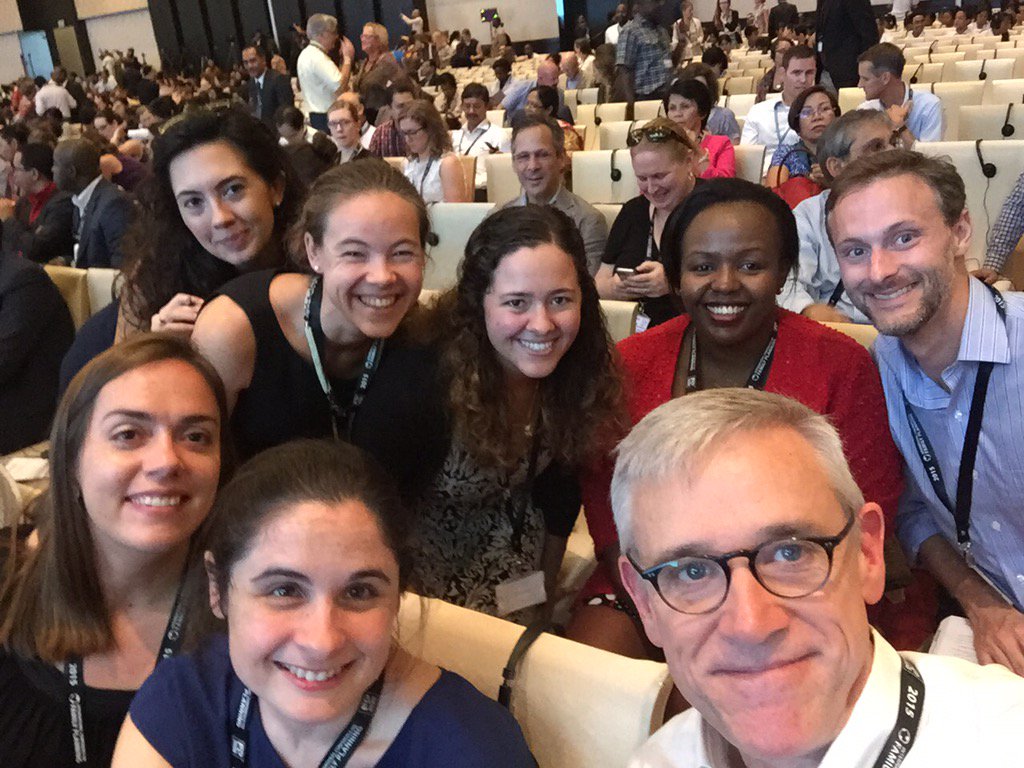The Health Policy Project ended in 2016. Work continued under Health Policy Plus (HP+) until 2022.
NEWS & VIEWS
January 26, 2016
By Jay Gribble, Deputy Director, FP/RH and Senior Fellow
This blog was originally posted on the official 2016 ICFP Conference Hub: http://crowd360.org/balifinally/
I’m excited to be here in Bali—after volcanoes and blizzards, it’s pretty amazing that we have come together once again to refocus efforts on family planning. I’ve been here only a few hours and I can already feel the good vibes. On my way to registration, several events caught my eye, and I think they capture the diversity that characterizes #ICFP.

The Health Policy Plus team at the 2016 International Conference on Family Planning in Nusa Dua, Indonesia
One sign I noticed announced a training session for learning how to insert implants. If non-clinical people (like me!) can be taught to provide implants in a day, then I’m confident that we can expand access to this important long-acting method through lower cadres of providers and help many more women achieve their reproductive goals. I didn’t get to sign up for the training, but I know what I can do to support improving access to implants: each of us needs to need to advocate hard for evidence-base policy changes related to who can provide this method; we need to push ministries of health to implement task sharing/task shifting policies that are already on the book; and we need to engage civil society and decision maker alike to hold governments accountable for following through on the commitments they have made to FP2020 and the Ouagadougou Partnership.
I saw another sign for the principal investigators of PMA2020 project—an effort to collect facility-based and individual-level data on a regular basis to help countries track movement on their FP2020 commitments. Coupling the use of new technologies for data collection with field work on a more regular basis—twice per year, countries involved in this project have the opportunity to keep their fingers on the pulse of what’s going on with FP in their countries. And with high-quality data provided on a regular basis, there’s the opportunity not only to monitor better, but also to hold governments accountable for what they have committed to do. We talk about evidence-based best practices, and with regular data, there’s the opportunity to be proactive and make changes where needed in program efforts, so that countries achieve goals they have set for themselves.
A third sign I saw was an all-day training on reproductive health for journalists. We can’t underestimate the importance of an informed media for raising awareness among the public and decisionmakers when things are not working right. Whether the news is related to funding, stock outs, policies that are not implemented—or virtually any other FP/RH issue that needs to be addressed, having the media understand them and cover them helps get attention and action around our issues. As we move into ICFP and the range of issues that will be addressed in the upcoming week, it’s exciting to know that journalists from around the world will be coving new findings, issues related to their countries, and seeing the opportunities from what they hear and see to raise in the news when they get back home. An informed media can hold decisionmakers accountable for following through on FP commitments, which can directly impact the quality of women’s lives.
ICFP appears to have something for everyone. One of the areas I’m most excited about is the advocacy and accountability tract—panels, posters, and even a space for salon sessions of interesting discussion on what’s new and how to do things better. Each of us has something to learn—and to offer, too. Each of us is an FP/RH activist in one way or another. We are here because we care and want to make a difference at wherever we can. Accountability can begin at the community, and can go up to the national parliament—making sure that public officials follow through on what they said they will do. Advocacy is equally broad—from making the case at the community when something needs to be improved, to working with parliamentary committees and ministries of finance to allocate needed funds to support programs. Look for the advocacy and accountability hashtag #ACT4FP and check out some of the sessions, salons, trainings, or posters; they are designed to help each of become more effective in our commitments to FP/RH.
We’re here in Bali—finally! Let’s make the most of the opportunity to learn and share, expand our networks, and head back home with a few new tricks up our sleeves!
What's New
- Something to Build On: “Innovation Exchange” Celebrates the Health Policy Project’s Close and a New Beginning
- What Will it Take for Tanzania to Achieve ART Targets and Ensure Long-Term Sustainability of the HIV Response?
- Helping Kenya’s County Leaders Advocate for Increased Health Investments
- HPP Holds Working Meeting on Ensuring Responsible PEPFAR Transitions for Key Populations
- Health Policy Project Celebrates 2016 International Women's Day
- HPP Staff Participate in White House Conference on HIV Stigma Reduction

